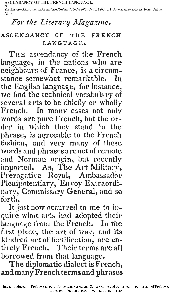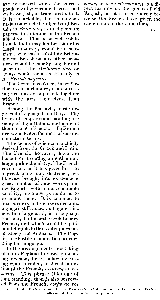 ―26― ―26―
For the Literary Magazine.
ascendancy of the french
language.
The ascendancy of the French
language, in the nations who are
neighbours of France, is a circum-
stance somewhat remarkable. In
the English language, for instance,
we find the technical vocabulary of
several arts to be chiefly or wholly
French. In many cases not only
words are pure French, but the or-
der in which they stand in the
phrase, is agreeable to the French
fashion, and very many of these
words and phrases are not of remote
and Norman origin, but recently
imported. As, The Art Military,
Prerogative Royal, Ambassador
Plenipotentiary, Envoy Extraordi-
nary, Commissary General, and so
forth.
It just now occurred to me to in-
quire what arts had adopted their
language from the French. In the
first place, the art of war, and its
kindred art of fortification, are en-
tirely French. Their terms are all
borrowed from that language.
The diplomatic dialect is French,
and many French terms and phrases
 ―27― ―27―
are preserved when the corres-
pondence of governments is carried
on in English, or translated into it.
It is remarkable, that the only oc-
casion on which the adjective of Bri-
tain is Britannic, is in diplomatic
papers, in imitation of the French
adjective. This is so well estab-
lished, that to say his British or his
English majesty, would be a sole-
cism; whereas to substitute Britan-
nic for British on any other occa-
sion, would be equally singular and
uncouth. The Britannic flect or
army, would sound as strangely as
his British majesty.
The terms in cookery, in confec-
tionary, in perfumery, in hair-dress-
ing are mostly imported, together
with the arts themselves, from
France.
Among the fine arts, music de-
rives its language from Italy. The
terms of sculpture and painting are
many of them Italian, and many of
them are also French. To France
are we indebted for most of our ar-
chitectural terms.
The terms of science are chiefly
derived from the Greek and Latin.
The French, however, have the
honour of inventing an entire new
language for chemistry. The French
revolution, as it has given birth to
a great many new doctrines, has
likewise brought into existence a
great number of new words; and
the English, with an unaccountable
servility, have always made haste
to adopt them. It is common to
hear writers and speakers declaim-
ing against France, and against in-
novation in general, in a language
that may be termed revolutionary
French, and which would be quite
unintelligible to the contemporaries
of Steele and Addison. The Eng-
lish are hostile to innovation in every
thing but language.
In the arrangements now taking
place in England to resist impend-
ing invasion, there is a law for rais-
ing what is called, in direct imita-
tion of the French, an army of re-
serve. This phrase (like one of
long standing, though also borrow-
ed from the French, corps de re-
serve, or body of reserve,) is a di-
rect hostility on the genius of old
English, but it is used merely be-
cause the French have given the
same name to the same thing.
N.
|